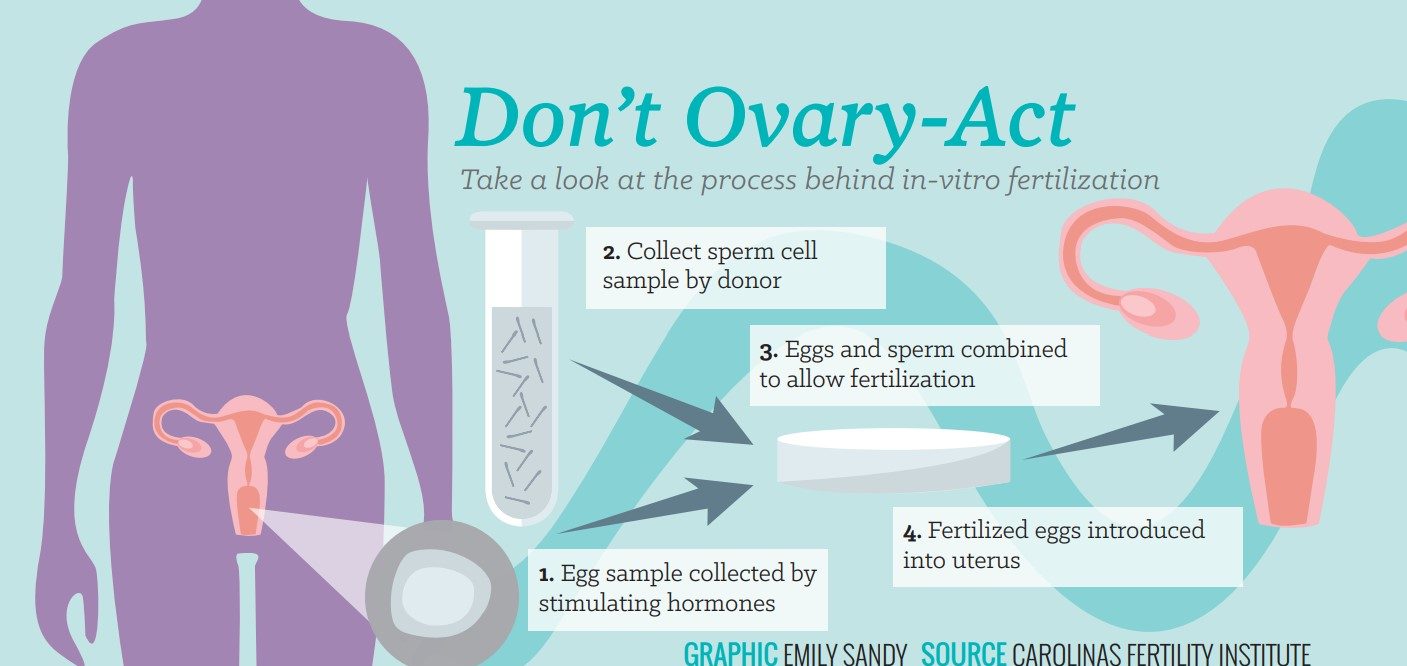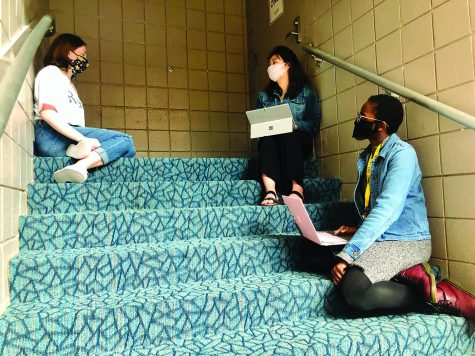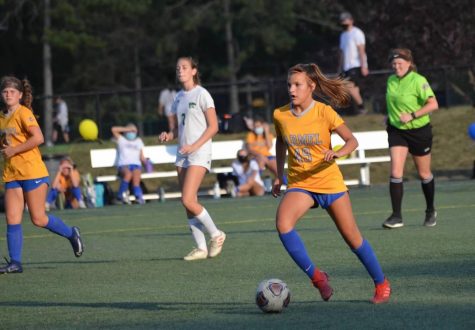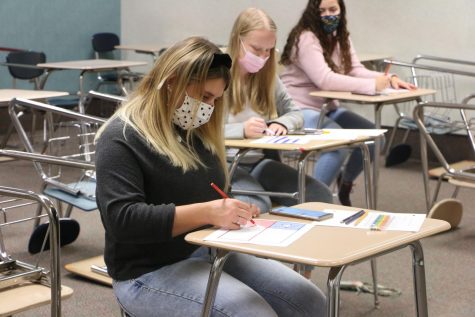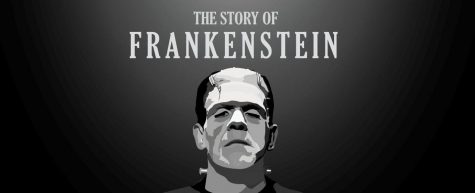Alternate Beginnings
Mother, daughter recount in-vitro fertilization, impact of fertility issues
Q&A with mother Sarah Burnham
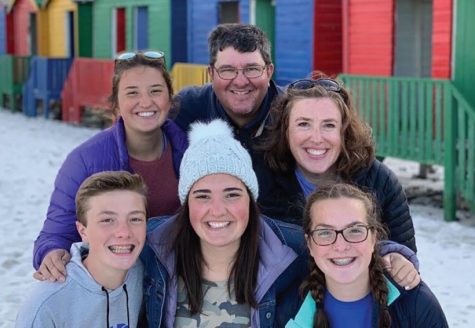
Sarah (top right) and daughter and sophomore Abigail “Abby” (bottom right) Burnham pose for a photo with their family. Abby and her twin brother Henry (bottom left) were born from IVF.
Submitted Photo: Sarah Burnham
Would you mind explaining the process of IVF?
I’ll be honest with you. It’s been a long time ago. I had to take shots for a couple (of) months beforehand and then they harvested the eggs. And then they fertilize them in the lab, and they put three embryos back in and then two of them took.
How many times were you pregnant?
I had 13 pregnancies total and 11 miscarriages because I lost a set of twins one time, so technically that was considered two. I’ve had three successful pregnancies and technically 11 miscarriages, but only 10 times because I did lose a set of twins.
Would you mind describing your journey to having your kids?
So, I had one miscarriage before I had our oldest daughter. And then we had Rebecca, and she was born in 1997. Then, when we tried to have another child (after Rebecca), I had an ‘ectopic pregnancy rupture.’ Had this happened today, it might not be as bad, just because they have a lot more like surgery options. However, at the time, it was bad because this was in 1992, 20 years ago. So, I had the rupture, and I lost two and a half liters of blood. I was in the hospital for five days, it was pretty ugly. Unfortunately, from all of that, I had developed a bunch of scar tissue. Then, about four or five months later, I had a second ectopic pregnancy but this one was called a ‘cornual ectopic pregnancy,’ where the embryo embedded on the outside of my uterus. Because of this, I had to have surgery. That baby lived until about 15 weeks, and then it died. And so then, I had to have that surgically removed. But because of both of those ectopic pregnancies, I developed an autoimmune disorder, which they think is from the ectopic pregnancies. But, we don’t know for sure because I don’t have any blood work from this that was specifically targeted to those (ectopic pregnancies) from beforehand. But all of the blood work that lines up with the autoimmune disorder, also was some of the markers associated with lupus, but I don’t have any of the lupus markers, just these certain targeted ones. So, I developed an autoimmune disorder, which then every time I got pregnant my body thought it was something foreign and so that fought it off. So, I’ve had one that lasted four months, then I lost it. Another time, one that would last three months and I lose it, and I just kept losing them earlier and earlier. Finally, they figured out that I had this autoimmune problem and so I had to take three shots of blood thinner every day. And the problem with taking the blood thinner, is that you have to be very careful because it can cause problems with the development of the placenta because your blood is sent in. And so that’s why I ended up having to do fertility treatments because I lost one fallopian tube (through this) so it was harder to get pregnant anyway, but I ended up having to do the fertility treatment. It was kind of a combination of everything with my autoimmune disorder and that blood thinner. Then, there was the fact that I only had half my body parts left. So, we did our first round of IVF and then the second one.
How did you feel throughout your journey with IVF?
The IVF process was disappointing when we lost the first one, for sure. I would say for me, the harder part was diagnosing what the problem was and figuring out how to treat the problem. Because, if I had IVF too soon, I still would have lost it, because they wouldn’t have been able to treat or diagnose and treat the actual problem. So, the harder part was all the miscarriages and then they just kept saying,‘we just can’t figure out what the problem is.’Because I had secondary infertility instead of primary infertility, it worked right the first couple times and then it was all downhill after that.
How did you feel when you realized not one but two embryos took and were going to have twins?
I was so excited because we had such a gap in age. Because, Laura was almost five when the twins were born. I just honestly always just prayed that if I was ever going to have one more that I would have two more so they would have a playmate.
What do you think got you to preserve through 11 miscarriages and keep trying?
I’ll be perfectly honest with you, I was an emotional disaster. There’s no doubt whatsoever. But, I just always felt like our family wasn’t complete. I had always just wanted to have a house full of kids. I mean I I did the whole thing. I went to college, got the job, worked for a while, got my MBA, and worked some more. But all I ever really wanted to do was a house full of kids. And so, I think it was that I also had family and friends that put up with my craziness, because it was hard. I spent a lot of days just sobbing. We didn’t, we didn’t look at adoption options but we’re not against that whatsoever. We did decide though that we wanted to make sure that we properly got a diagnosis. First, we didn’t ever want to wonder, ‘well, what if’. Then, we decided that after we got a diagnosis and we couldn’t do anything about it that we were going to adopt. We were going to have a house full of kids one way or another.
How did you feel emotionally when you had a miscarriage?
For a few, I think I handled it just because I had known other people who would have them. And, unfortunately, I knew that it does happen and so I think I just kind of got through I just was just like, ‘oh this stinks.’ But, when they just (kept) happening, I was especially emotional because they couldn’t figure out the why. That’s when I had a very difficult time. I think just being by nature, I am a problem solver. I mean, that’s what my secondary degree is. I’m the person that you hire to go into a company and solve a problem, but I couldn’t even identify the problem. Not knowing why it was all happening was very hard for me, because I couldn’t do anything about it. It was a very helpless feeling. And just hormonally, sometimes I would just cry hysterically for days and then the gratitude would kick in, and I would be grateful for the children I did have. Also, along the way, I met quite a few people who lost children that they had. They either lost them right after birth or they had to deliver them and they died, or they had children who died from cancer or things like that and that always gave me a sense of perspective.This sounds kind of sad to say but I was always grateful that I experienced the loss before I got to know the baby. So, I was mourning kind of the future as opposed to mourning the baby. I never got to know any of them and that did give me some gratitude. I think you just figure out the way to be grateful for what you do have and then that helps things not seem quite so awful.
What would you say to someone who is currently like dealing with problems with infertility and IVF?
My biggest regret was not getting professional emotional support. Having a couple miscarriages is one thing but having as many as I had, I was kind of beyond what normal friends can help the other one with. I am so grateful to see all the advances in mental health. Because now, my case would have been treated much differently. I know everybody did the best they could at the time but I think (not) getting the right professional emotional support hurt me. There was no doubt looking back that I was severely depressed and I had horrible anxiety from all of it. So, I would say get that emotional support that you need and definitely keep looking for a doctor. For me, getting the diagnosis so you could figure out what you were actually dealing with was very important. My first doctor just kept saying, ‘wow, I mean it should happen.’ And after a while I’m like, ‘I can’t do this anymore’. So I think finding a doctor that you feel very comfortable working with and who is aggressive at the level that you are personally comfortable with (is important). And then just finding your own personal means of dealing with it, either your faith, your friends, your family, and that’s kind of different, all those things are very important to me. But,I think figuring out what works for you is the most important thing. I spent quite a few years trying to help other people, just trying to be someone that you could talk to because unless you actually walk the walk;helping to support someone you know without fully understanding what it feels like is really hard. Those are the things that I found to be the most helpful. I’ll also be honest with you;I couldn’t have identified any of that at the time. I’m 15 years out and I see things much differently now.
What would you say to someone who is at the beginning of the IVF process?
Be patient. By the time you get to infertility treatments, usually you’ve been patient for a long time. And so having someone say,‘be patient,’ might make you want to punch someone, but unfortunately IVF does terribly test your patience. I would also say just again make sure that you get the mental health resources, and (talk to) friends and family. I had to kind of block myself off from a few people for a little while because either friends that I knew were having kids and it just was too upsetting or my family would say, ‘just be grateful for what you do have,’ but that didn’t validate my losses. I found the emotional (aspect) to be much more difficult. So I think making sure you have that support structure and not being afraid to get the mental health support that you need (is important)
Do you ever feel like you are part of an IVF/infertility community?
Yeah, we (as a community) have said,‘yep I bought that T-shirt.’ I don’t do it as much anymore, but like I told Abby I said I will talk to anyone and help anyone, in any way I possibly can get to get them through this. But I have definitely tried to be a support person and always be very upfront and honest. I’ve always been very honest about it just because I’m not afraid of my story, or embarrassed by my story. If I can help somebody else, I just try to be honest and then hopefully somebody can reach out if they need it.
Do you think having fertility problems changed your perspective on life?
Yes, for sure. I always said I’m not grateful for what I went through but that I’m very, very grateful for what I learned from the process. I learned how to be a better friend, I learned how to be kind of a better mom, and to look for the good in things.
If you could say something to your younger self when you were just at the start of all this, what would you say?
I guess I would (say to) my younger self to trust the doctors and trust yourself. Trust God’s plan for your life. I’m learning that I was not actually in control. I mean, like I said, I have a master’s degree in being in charge of things. And so, I’m realizing that a lot of life is out of your control. I wish I would have embraced that earlier so I might not have been so crazy or angry. And I do think that that stems from a lot of the stuff that I’ve been through; it’s out of my control. I do my very best with what I can and then (am) grateful for things so it does help. I think when you deal with a lot of that it does help your perspective.
What else do you think you’ve learned from your experience with infertility and IVF?
I’ve learned that unfortunately in life, that there is a lot that happens. I remember my dad saying to me, 10% of life is amazing, 10% sucks, and then the other 80% is somewhere in between. I always thought that all my fertility problems were in the 10% of awful until I was able to kind of step back and say that I learned a lot. I did end up getting to have Henry and Abby. I was one of the lucky ones in that not everybody does have a successful outcome. It definitely taught me to be more grateful and to have perspective and but then also to not ever give up. You know if you truly believe in something, then you’ll figure out some way to get there. I mean,like I said, we were not ever against adoption either, we were going to have a family one way or another and you just have to be willing to put forth the effort.
Would you encourage people to talk about it more like the subject of infertility?
Yes. I feel like it is a bit of a taboo topic now and should be addressed more. Infertility is a much more prevalent subject because women are waiting a lot longer to have kids. It wasn’t as big of a deal 30, 40, 50 years ago because women just had children significantly younger and now a lot of women have careers first.
Q&A with sophomore Abigail “Abby” Burnham
When and how did you find out that you were born with the help of IVF?
I don’t even know. It wasn’t like a serious conversation or something. I feel like it (was) just like they said something and I was just like, ‘Oh, I had no idea.’
Do you think that being born with the help of IVF has changed your perspective on life?
Honestly, I didn’t even know that I was born for IVF until a couple (of) years ago. It doesn’t really change me and that I’m happy. But, it also taught me that (my mom) did have to persevere through that and it just showed me how strong she is.
Do you think this has impacted your relationship with your mother?
It just gives you a personal perspective on what kind of person my mom is, even though she had to go through all that, for sure.
Do you think this will impact you when you think about having kids?
I don’t really know just because I don’t know if I’ll have the same kind of (infertility) problems, but I do know that if there is something wrong that I’ll have someone that I can go to or have someone that I can ask questions to and feel comfortable asking about (my mom), but I feel like as of now, I don’t really know.
